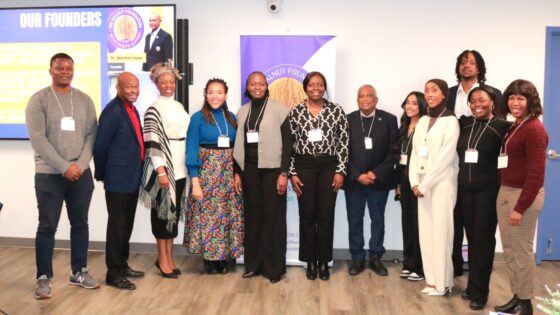on
BY ALYSSA MAHADEO
One might argue that the world would look better if everything was in black and white. The Toronto Black Film Festival (TBFF) is back in town, celebrating its fourth year, just in time to mark the annual festivities of Black History Month. Presented this year by Global News in collaboration with TD Bank this brilliant and highly anticipated festival runs from February 10 –14th featuring the best that black cinema has to offer.
This year the line-up includes eight world premieres, with forty four films to be screened emerging from twenty countries, including Belgium, the Bahamas, Canada, Cameroon, Cuba, Dominican Republic, France, Germany, Haiti, Nigeria, Portugal, South Africa, Spain, Trinidad & Tobago, Nigeria, the UK and the United States of America.
The TBFF was founded by the Fabienne Colas Foundation and is dedicated to commemorating the very best in cinematic work focusing on the familiarities of black people from a diversity of communities. Their mission is to provide an equal chance for filmmakers from all ethnic backgrounds to share their own unique perspective on the everyday realities faced by people of the black communities. The TBFF offers their podium to new voices in cinema and encourages audiences to see the world through the lens of diversity.
Coinciding with Black History Month, the TBFF is proud to host another year in celebration of diversity within the black communities with a collection of powerful films, exciting panels and special events throughout the week. “TBFF showcases the most outstanding and amazing black films while creating a space to debate major cultural, social and socio-economic issues,” said
One might argue that the world would look better if everything was in black and white. The Toronto Black Film Festival (TBFF) is back in town, celebrating its fourth year, just in time to mark the annual festivities of Black History Month. Presented this year by Global News in collaboration with TD Bank this brilliant and highly anticipated festival runs from February 10 –14th featuring the best that black cinema has to offer.
This year the line-up includes eight world premieres, with forty four films to be screened emerging from twenty countries, including Belgium, the Bahamas, Canada, Cameroon, Cuba, Dominican Republic, France, Germany, Haiti, Nigeria, Portugal, South Africa, Spain, Trinidad & Tobago, Nigeria, the UK and the United States of America.
The TBFF was founded by the Fabienne Colas Foundation and is dedicated to commemorating the very best in cinematic work focusing on the familiarities of black people from a diversity of communities. Their mission is to provide an equal chance for filmmakers from all ethnic backgrounds to share their own unique perspective on the everyday realities faced by people of the black communities. The TBFF offers their podium to new voices in cinema and encourages audiences to see the world through the lens of diversity.
Coinciding with Black History Month, the TBFF is proud to host another year in celebration of diversity within the black communities with a collection of powerful films, exciting panels and special events throughout the week. “TBFF showcases the most outstanding and amazing black films while creating a space to debate major cultural, social and socio-economic issues,” said Fabienne Colas, President and Founder of the TBFF. “Festival goers will have the chance to see actors and directors from here and abroad sharing their passions. There’s something there for everyone!”
TBFF is excited to rekindle their partnership with Global News again this year and welcome TD Bank as co-presenters in alliance with TD’s 2016 Black History Month Series celebrating the arts and culture of the city.
Opening night presentation is entitled THINA SOBABILI (The Two of Us), an emotional and touching drama about two siblings who find themselves in a strained relationship when the possibilities of a different life is an opportunity one must take in order to find happiness. Directed by Ernest Nkosi this film was South Africa’s submission to the Academy Awards for the Best Foreign Language Film Category.
Marking the 50th anniversary of the creation of the Black Panther Party the TBFF is honored to present The Black Panthers: Vanguard of the Revolution, which is the first feature length documentary commemorating The Black Panthers directed by Stanley Nelson. Other noteworthy documentaries include Soul on Ice: Past, Present Future, directed by Damian Kwame, recounting the legacy of black hockey players, Game Face by Michiel Thomas, about gay and transgendered athletes and In My Father’s House, directed Ricki Stern and Annie Sundberg, about the hip hop artist Che “Rhymefest” Smith and his attempts to reconnect with his alcoholic father.
Closing Night will host Mark Donford-May’s BREATHE UMPHEFUMLO a tribute to the Puccini opera La Boheme. This alluring musical drama displaces struggling students from Paris to a South African shantytown. Whilst fighting amongst themselves for food and water, the take no notice that one individual in their entourage is suffering from TB.
Venues for this year’s screenings include Carlton Cinema, the Isabel Bader Theatre, Jackman Hall, and Théâtre de l’Alliance Française and Collège Boréal all located at various points in the city.
New additions to this year’s festival is the TBFF Black Market, which is a series of industry panels and workshops with internationally renowned leaders, experts and visionaries who will shed some light on today’s most critical filmmaking issues. Special events to look forward to include a Q&A discussion with The Book Of Negros award-winning director Clement Virgo, alongside a panel discussion about the diversity on screen featuring award-winning filmmaker Trey Anthony as well as a workshop organized by Actra Toronto on the How and Why of Making short films.
Also in collaboration with G98.7 one of their many sponsors, G.98.7 will host a “real-talk” session about the realities of the film industry, touching on topics that include: Diversity on the Screen, Black Women Entrepreneurs, How to Break into Acting and Is Basketball more than a game? This year’s featured guests include casting agent Warren Beatty and former CFL player Damon Alan.
Films screened at this year’s festival will be vying for the title of TBFF Audience Choice and winners will be announced on Closing Night.
“The beauty of the Toronto Black Film Festival is that we don’t just appeal to one group in the community we have a broad Torontonian audience comprised of Black people, White people, Indian people, Latino people, it doesn’t matter who you are everyone comes to see those films,” explains Colas. “The audience is very diverse, which is pleasing to see when all of the different races come together in one room to celebrate everyone’s heritage and culture.”
Tickets for the TBFF are available online where you can purchase a priority all access passport card to all events for $140 or $10 for all individual film presentations with the exception of opening night at $25. Festival goers are encouraged to help the festival flourish in the years to come by making a donation, spreading the word or getting involved as a volunteer or become an Ambassador.
A full list of events films and timings can be found online at www.TorontoBlackFilm.com including exciting synopsis and so many enticing films to choose from, this isn’t an event you want to miss. The TBFF runs from February 10-14th, and will continue to serve the diversity of the people for years to come. , President and Founder of the TBFF. “Festival goers will have the chance to see actors and directors from here and abroad sharing their passions. There’s something there for everyone!”
TBFF is excited to rekindle their partnership with Global News again this year and welcome TD Bank as co-presenters in alliance with TD’s 2016 Black History Month Series celebrating the arts and culture of the city.
Opening night presentation is entitled THINA SOBABILI (The Two of Us), an emotional and touching drama about two siblings who find themselves in a strained relationship when the possibilities of a different life is an opportunity one must take in order to find happiness. Directed by Ernest Nkosi this film was South Africa’s submission to the Academy Awards for the Best Foreign Language Film Category.
Marking the 50th anniversary of the creation of the Black Panther Party the TBFF is honored to present The Black Panthers: Vanguard of the Revolution, which is the first feature length documentary commemorating The Black Panthers directed by Stanley Nelson. Other noteworthy documentaries include Soul on Ice: Past, Present Future, directed by Damian Kwame, recounting the legacy of black hockey players, Game Face by Michiel Thomas, about gay and transgendered athletes and In My Father’s House, directed Ricki Stern and Annie Sundberg, about the hip hop artist Che “Rhymefest” Smith and his attempts to reconnect with his alcoholic father.
Closing Night will host Mark Donford-May’s BREATHE UMPHEFUMLO a tribute to the Puccini opera La Boheme. This alluring musical drama displaces struggling students from Paris to a South African shantytown. Whilst fighting amongst themselves for food and water, the take no notice that one individual in their entourage is suffering from TB.
Venues for this year’s screenings include Carlton Cinema, the Isabel Bader Theatre, Jackman Hall, and Théâtre de l’Alliance Française and Collège Boréal all located at various points in the city.
New additions to this year’s festival is the TBFF Black Market, which is a series of industry panels and workshops with internationally renowned leaders, experts and visionaries who will shed some light on today’s most critical filmmaking issues. Special events to look forward to include a Q&A discussion with The Book Of Negros award-winning director Clement Virgo, alongside a panel discussion about the diversity on screen featuring award-winning filmmaker Trey Anthony as well as a workshop organized by Actra Toronto on the How and Why of Making short films.
Also in collaboration with G98.7 one of their many sponsors, G.98.7 will host a “real-talk” session about the realities of the film industry, touching on topics that include: Diversity on the Screen, Black Women Entrepreneurs, How to Break into Acting and Is Basketball more than a game? This year’s featured guests include casting agent Warren Beatty and former CFL player Damon Alan.
Films screened at this year’s festival will be vying for the title of TBFF Audience Choice and winners will be announced on Closing Night.
“The beauty of the Toronto Black Film Festival is that we don’t just appeal to one group in the community we have a broad Torontonian audience comprised of Black people, White people, Indian people, Latino people, it doesn’t matter who you are everyone comes to see those films,” explains Colas. “The audience is very diverse, which is pleasing to see when all of the different races come together in one room to celebrate everyone’s heritage and culture.”
Tickets for the TBFF are available online where you can purchase a priority all access passport card to all events for $140 or $10 for all individual film presentations with the exception of opening night at $25. Festival goers are encouraged to help the festival flourish in the years to come by making a donation, spreading the word or getting involved as a volunteer or become an Ambassador.
A full list of events films and timings can be found online at www.TorontoBlackFilm.com including exciting synopsis and so many enticing films to choose from, this isn’t an event you want to miss. The TBFF runs from February 10-14th, and will continue to serve the diversity of the people for years to come.
Stay in the loop with exclusive news, stories, and insights—delivered straight to your inbox. No fluff, just real content that matters. Sign up today!













